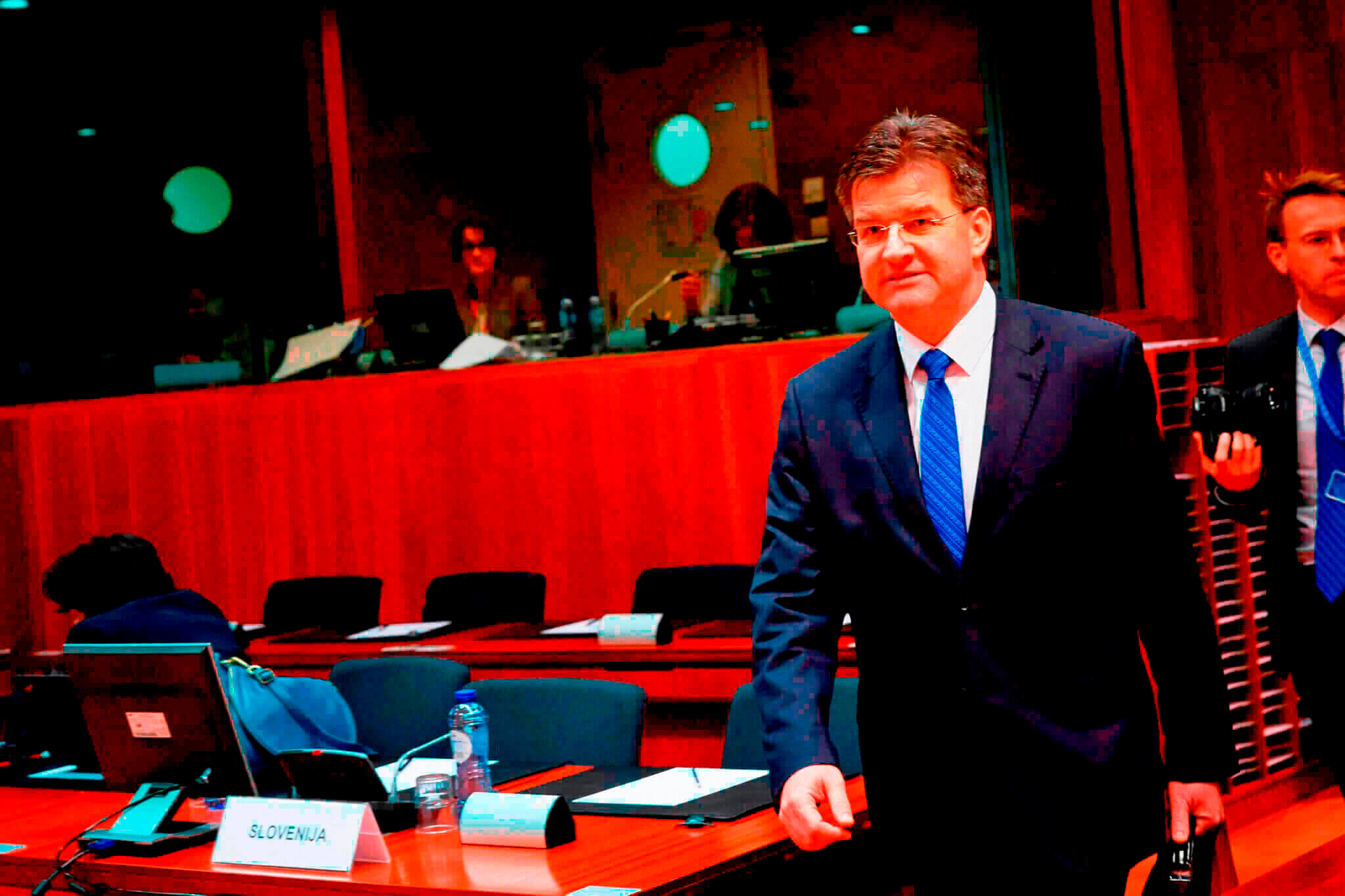Grenell’s tweet dispelled all doubts: yes, there are two parallel, maybe even competing processes of the dialogue between Belgrade and Pristina. The EU special envoy could not imagine a more difficult start in his new job. First, he took the office in the midst of a global pandemic. Now, on the day of his first visit to Pristina, his American counterpart is inviting leaders to a meeting at the White House (June 27). Even the plane he was supposed to arrive with did not take off due to technical problems so he flew in to Kosovo a day later than planned.
The experienced Slovak diplomat takes office under difficult circumstances. The credibility of the EU in Kosovo has been eroding for some time now. In European Commission’s document on the “credible enlargement perspective” from February 2018, Kosovo is mentioned exclusively in the context of the dialogue with Belgrade. Five EU member states do not recognize Kosovo. Visa liberalization has yet to reach the Council’s agenda. A number of countries (18) have withdrawn recognition; membership in UNESCO and Interpol, two significant international organizations has not been achieved. At the same time, the public in Pristina is divided over loyalty to key allies – the United States and Germany. The way in which the government of Albin Kurti was toppled led for the first time to a perception that Berlin, and not Washington, is now the key ally; this despite the fact that – at least until now – Kosovo “got” something only if the United States stood firmly behind it (the transformation of the Kosovo Security Force into Kosovo Army serves as the last example).
At the same time, the impression is – perhaps wrong – that American initiative is a few steps ahead. We say perhaps wrong, because the two agreements signed in February at the Munich Security Conference are only letters of intent. Second, at least nominally, Pristina and Belgrade continue to aspire to EU membership. However, unlike the EU, the United States does not face the problem of lack of coordination (despite earlier rumors that State Department and the White House look at the issue differently). Grenell is driven by the ambition to get an important place in (still possible) second Trump administration. He was entrusted, or he asked for a clear mandate: to reach an agreement before the presidential elections. The view focusing solely on reelection is somewhat simplistic – an independent Kosovo, whose statehood is no longer brought into question, serves American interests in the Balkans, the continuous presence and dominance of DC in this region against the opposition of rising “third actors” – Russia, China, and now Turkey. At the same time, current administration does not see eye to eye, to say at least, with the EU on a number of issues – the last one concerns the decision of the US to impose sanctions on the officials of the International Criminal Court. Therefore, Washington’s decision not to inform Europeans about Grenell’s latest initiative may not come as a surprise.
The German response was to stand behind Lajčak; publicly oppose border correction as part of the solution; but it is not clear whether they have succeeded in getting other members’ (read: France’s) attention, that is, whether – if an agreement is indeed reached – Berlin would directly oppose the United States. The difference in approach was also seen on the issue of 100% tariffs (introduced by Kosovo to goods produced in Serbia); while Kurti’s idea of “reciprocity” was understood in Brussels and Berlin, it was unacceptable for Grenell, who asked for their full revocation.
Discussions over a possible settlement have been going on since the European Forum in Alpbach (September 2018). Experts focused on its most controversial part – the possible correction of the border (administrative line), quickly dubbed “land swap”, due to understandable implications for the region. The technical agreements reached within the EU-led dialogue in Brussels have fallen into the background. As the interests of Washington and Berlin have been elaborated in earlier texts, in our analysis, we will try to understand the interests of the four sides in the process – Belgrade, Kosovo Serbs, Pristina and the “region” (Western Balkans).
What does Belgrade, that is, the President of Serbia, want? In talks with numerous delegations, including international civil society, Vucic repeatedly used the term “face-saving” in English, “so that Serbia gets something”, which is presented to the public, here and abroad as compromise. That compromise, until the summer of 2018, was understood as the establishment of the Association/Community of Serb Municipalities (ZSO in short in Serbian), previously considered a “victory” over Pristina. If the ZSO does not get established – and the impression is that it has become unacceptable to Pristina – then that “something” is territory; especially if formal recognition is “on the table”. However, there is also a problem: as shown in the public opinion poll presented by the Center for Social Dialogue and Regional Initiatives (CDDRI) in October 2019, an act of explicit recognition would split the SNS (Vucic’s party) electorate roughly in half.
What is the absolute interest of Serbs in Kosovo? First of all, for someone to finally listen to them and respect their views (which seems unlikely at this point). Then, keeping a functional relationship with Belgrade, which means financing – salaries, health care system, education system, social benefits. This does not mean “good salaries” but certainty that Serbia will continue to help and employ. (For many families, this policy, often and rightly criticized, is still a measure of staying in Kosovo.) This is followed by the protection of religious and cultural heritage. Finally, the prevention of majoritarianism in Serbian communities. Somewhere in the background is a kind of political autonomy, whether for the north of Kosovo or the municipalities in which Serbs make up the majority (one might say “ZSO-2”).
What is the interest of Albanians in Kosovo (Kosovars)? Not so much mutual recognition as an open path to key international organizations – NATO and the EU. How can this happen if the assumption is, first, that you are recognized by those five EU members (including four NATO members) that do not recognize you; and second, to become a member of the UN – where is Russia (and perhaps China) standing in your way? Even if Kosovo gets the most progressive government, it cannot go further in European integration than the Stabilization and Association Agreement. Kosovo remains one of the few territories in Europe whose citizens need a visa to enter the EU. Despite their outrage and calls to and from political leaders and civil society representatives, visas stay in place.
At the same time, no matter how strange that statement may seem in Belgrade, public opinion in Pristina is tired of making concessions to Serbia. In the extremely complex context of the dialogue, Serbia, thanks to a change in international circumstances (the arrival of the populists in power, the descent from the scene of a generation of politicians who created a post-Dayton consensus in the Balkans), managed to do two things – contest Kosovo’s statehood internationally without being punished for it (revoking of recognitions, failure to secure UNESCO, Interpol membership) and to “normalize” the narrative that Kosovo must give another concession to Belgrade. On the other hand, Belgrade had a right to feel cheated when it became clear that there was no will in Pristina to allow the establishment of the ZSO. How much Belgrade sincerely believed in it is another question.
That was one of the issues with Kurti – he thought, as many Kosovars do, that Ahtisaari’s package was a sufficient concession and that there could be no new ones, although the Brussels Dialogue was largely dedicated to precisely that – concessions done by one side to the other to allow for normalization. Although the new Prime Minister Abdullah Hoti took a seemingly firm stance (“Kosovo’s territorial integrity is not negotiable”; “end the conflict through an agreement on normalization of relations and reciprocal recognition”; “agreement with Belgrade must be in accordance with the Constitution of Kosovo“), from the statements of officials and advisers close to the new government, it is clear that greater flexibility can be expected. This, after all, was confirmed by the revocation (perhaps it is more correct to say suspension) of the tariffs on Serbian products the day after the new government took office.
Finally, what does the region want? In addition to opposing the correction of borders (which, it must be said, Serbia has not recognized for 12 years), the leaders in the region are wary of each other. Therefore, they were not in the mood to come out with their vision of overcoming the conflict, except for calling for, for example, North Macedonia and the Prespa Agreement as inspiration, which simply does not stand (except in terms of goodwill, which is necessary). The issue at hand is different – not more or less difficult, just different. Vucic’s recent public appearances, in which he criticizes his neighbors, even calling them “servants” of the international community (appearance on TV Prva on Saturday, June 6) are illustrative.
Perhaps worst of all is that public opinion on both sides is tired of the dialogue itself. As the author has been told in several places, everyone involved in the process knows that the elites have “abused” the dialogue. The administration in Brussels did not act aggressively – it wanted Belgrade and Pristina to “own” the process that would, step by step, lead to normalization through integration and the transfer of competencies. Such approach was opposite to the American one. One of the big mistakes – necessary, however, in order for the dialogue to continue and maintain public support – was to allow each party in the process to interpret the agreements reached as it saw fit. This is not a semantic difference; in this way, the expectations of the public were “pumped” and the process was used for the purposes of electoral success, instead of leading to real peace.
What can Lajčak offer? Unfortunately, not so much – because, before anything else, there is no clear European perspective for Kosovo; the ZSO is perceived in Kosovo as the new Republika Srpska in the making; while technical dialogue has exhausted all seemingly important topics. On the other hand, Grenell will push forward a package of support to infrastructure and energy, which may be the most concrete part of the American version of the agreement. If the mentioned letters of intent are any indicator, then the US-brokered agreement will be nothing more than a list of principles (several colleagues use the term “phase one agreement”) that will be left to the EU to implement. Hence the concern, the skepticism of Europeans is understandable. As well are the chances that the agreement signed on the White House lawn will be implemented at all.
First published in Novi magazine weekly No. 477 on 18 June 2020













